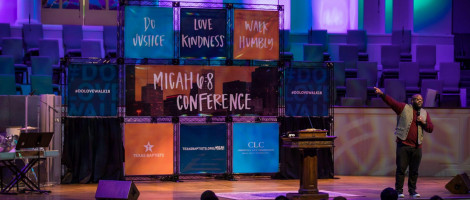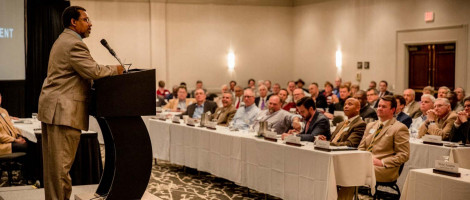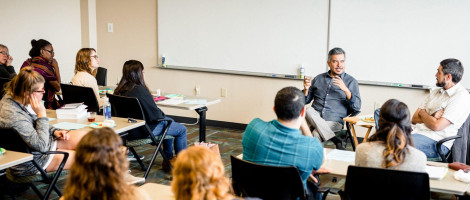Articles by Guest Author
91 - 100 of 172 articles

From Revolving Door to Highway of Redemption: The Church’s Response to 'Second Chance Month'
by Guest Author on April 23, 2018 in CLC
By Caleb Seibert
This month, the Christian Life Commission joined Gov. Greg Abbott and several groups to declare April “Second Chance Month” for formerly incarcerated individuals. Second Chance Month is an opportunity to highlight the challenges of formerly incarcerated individuals and their families and to share stories of redemption for those who have successfully overcome their criminal pasts.
Nearly 70,000 people are released from Texas state prisons every year, but most churches have little to no interaction with them. These people and their families often face a mountain of obstacles to re-entry ranging from work barriers and criminal debt to the deep stigmatization that comes with their past experiences.
Research by Lifeway Publishing in Nashville seems to echo this sentiment. After polling 1,000 Protestant churches, Lifeway found that 31 percent said no former inmates attended their church, 36 percent said one or two former inmates attended, and only 33 percent indicated three or more former inmates attending their church.
Hebrews 13:3 says to “remember those who are in prison, as though you were in prison with them.” How can Christians remember those who are in prison and those who have been released?
Here are four practical suggestions for ministry . . .
Texas Baptist CLC joins with Prison Fellowship to recognize April as Second Chance Month
by Kalie Lowrie on April 16, 2018 in CLC
The Texas Baptist Christian Life Commission has partnered with Prison Fellowship and more than 150 other organizations to recognize April as Second Chance Month, in remembrance of the 65 million people with a criminal record with limited access to education, jobs and other opportunities.

Bless This Meal: A Biblical Perspective
by Ali Corona on April 16, 2018 in CLC
By Ali Corona
He may have felt insignificant -- a young boy walking home with a basket of lunch for his family -- five small loaves and two fish.
With a glance toward heaven and a heartfelt prayer, Jesus multiplied a few parcels into a lavish feast for a crowd that was hungry for spiritual and physical nourishment.
All four gospels recount this important moment in history. The sight of the unseen Kingdom colliding with the world must have made a deep impression on each of their hearts and minds.
Today, an estimated 795 million people around the world are undernourished. In Texas, 1 in 6 families are unable to put meals on their tables everyday. Hunger, both physical and spiritual, is devastating.

Micah 6:8 conference encourages believers to love neighbors and display God’s holiness
by Kalie Lowrie on March 29, 2018 in News
A diverse crowd of more than 300 united in worship and heeded the call to live in right relationships with God, self, others and creation at the Texas Baptist Christian Life Commission’s Micah 6:8 Conference March 23-24 in Sugar Land, Texas.

The Gospel, Gentrification, and Shalom
by Guest Author on March 6, 2018 in Christian Life Commission
The word “gentrification” is akin to “cancer” in many communities for those who have given their lives to challenges and concerns of these neighborhoods. The reality is that communities are always evolving into new shapes and forms as new people, businesses, ministries, and development change the cultural landscape.
I hear the words of Jeremiah ringing in my ears from church planters to well-established pastors. However, I often sit with multiple community investors who harbor a sense of discomfort and disappointment with the changing context. When offering counsel, the question that must be answered, is what does God want? Does God care for those new residents as much as the existing residents and how do we live together to the glory of God?

Our First Freedom: What You Need To Know About Religious Liberty
by Guest Author on March 5, 2018 in CLC
By John Litzler
Religious liberty is a bedrock American freedom, but a number of legal issues related to this freedom are being sorted out in the courts and news media today.
In some ways, the Supreme Court’s landmark 2015 Obergefell decision legalizing same-sex marriage in the United States raised more questions than it provided answers. In its opinion the Court concluded that “same-sex couples may exercise the right to marry” and also said “the First Amendment ensures that religious organizations and persons are given proper protection as they seek to teach the principles that are so fulfilling and so central to their lives and faith.” What happens when these two liberties appear at odds with one another?
One example of this conflict between freedoms occurred in both California and Colorado. In each place, a same-sex couple, exercising their right to marry, sought to hire a baker to create a cake for the couple’s wedding and in each case the baker declined asserting that the baker’s religious beliefs prevented the baker from making a wedding cake for a same-sex marriage.

Book Excerpt: Leadership in the Black Church
by Guest Author on February 23, 2018 in CLC
Excerpt from the book: Leadership in the Black Church: Guidance in the midst of Changing Demographics, by Dr. Michael A. Evans, Sr.
African-American clergy are expected to be upfront and outspoken on issues of justice and equality to say the least. The reason it is different in the black community is because of the African-American church.

Executive Board aims for agility in meeting needs, reaching next generation for Christ
by Kalie Lowrie on February 20, 2018 in News
The Executive Board of the Baptist General Convention of Texas approved a motion on Tuesday to form a committee to research ways in which the Convention could be more agile in response to emerging needs.

Training eternally-focused churches in community ministry
by Kalie Lowrie on January 16, 2018 in Great Commandment

Four Simple Ways to Celebrate Advent in a Meaningful Way
by Ali Hearon Corona on December 7, 2017 in CLC
Advent is upon us. Candles burn in Sunday services, Christmas tree lights twinkle, and even a chilly breeze settles in my corner of Texas. Advent is a time set aside to remember and expect our King as He enters into human suffering. The season exemplifies joy and waiting as we celebrate the birth of our Savior. And yet, the excitement of Advent seems like a stark contrast in light of so much pain and darkness in our present society. Everything in our culture seems to breathe a wearied and weathered sigh. The news continues to portray stories of suffering and conflict, such as sexual harassments, shootings, and uncertainty for DACA recipients and refugees. We mourn the pain of the world and in the same breath we rejoice for the hope the Lord gives. During these few weeks leading up to Christmas, Christians have the opportunity to understand the magnitude of who our King is and worship Him with our whole hearts. He is the God who came into humanity and experienced suffering in order to bring freedom. Jesus is the ultimate bridge builder between God and humanity.